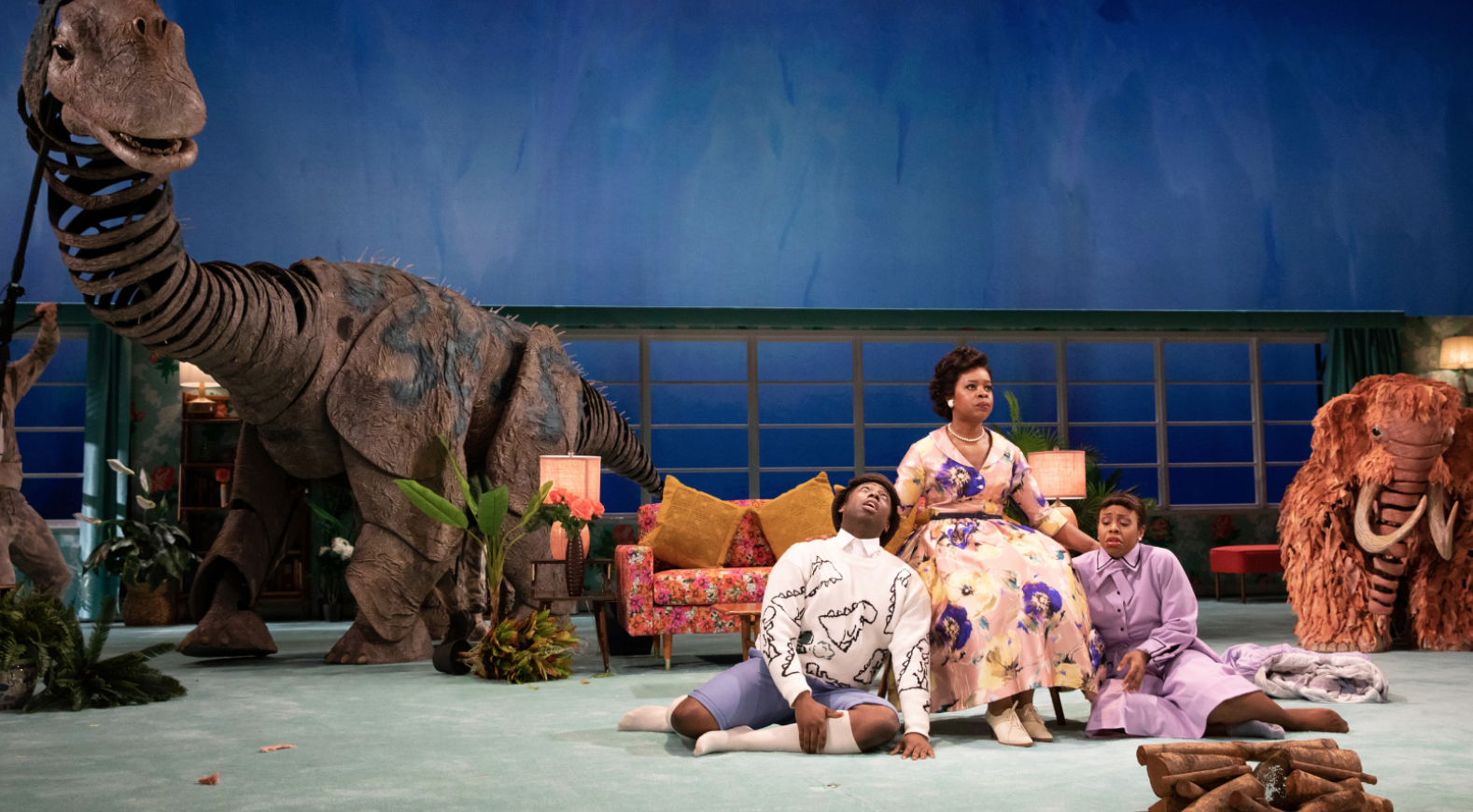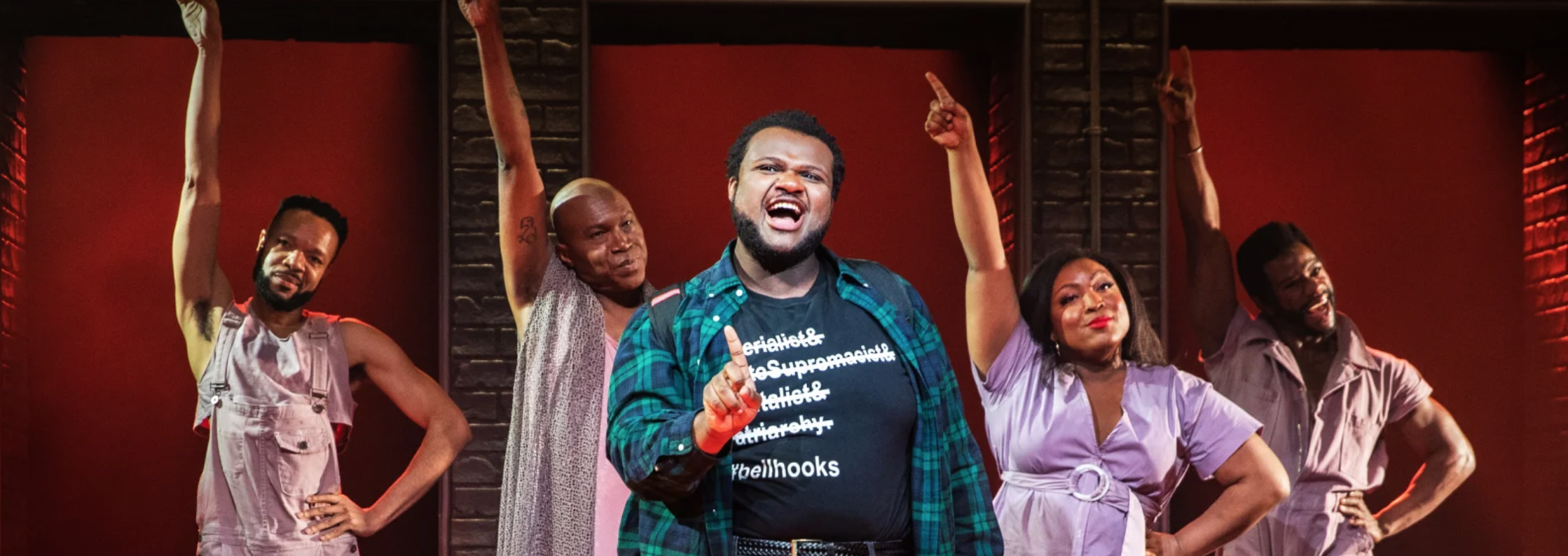Welcome to today’s edition of ShentonSTAGE.
Yesterday I made my first return to London since my spinal surgery two weeks ago, and at the end of next week will be back in New York, as well, thus spanning my personal favourite theatre cities in the English-speaking planet. I’ll be covering some of this here in my regular newsletters.
My personal world, as I’ve documented here before, has changed a lot in the last few years, and not just because of COVID which of course produced a reckoning for us all; my own changes have stretched from the circumstances that have led me to having multiple rounds of back surgery, to relocating my principal home outside of London.
But then the world has changed for everyone. We are — finally it seems — ready for major changes in our theatrical culture and landscapes, too. This was thrown up this week by two very radical pieces of theatre, opening a night apart on Broadway; first on Monday, a rare Broadway sighting of Thornton Wilder’s 1943 Pulitzer prize winner THE SKIN OF OUR TEETH, in a new production that re-pivotes and centres the play’s already bold remagining of history through a different racial lens; and then last night by the arrival of a more recent Pulizer winner, MIchael R Jackson’s autobiographical musical A STRANGE LOOP, after premiering at Off-Broadway’s Playwrights Horizons in 2019.
THE SKIN OF OUR TEETH
Produced at Lincoln Center’s Vivian Beaumont Theatre under the auspices of Lincoln Center Theatre, THE SKIN OF OUR TEETH is directed by the company’s resident director Lileana Blain-Cruz.

As David Cote notes in his perceptive review for the New York Observer, she is “both a resurrector and an exorcist—casting out the demons of white supremacy from the body of Wilder’s masterpiece. Her acting ensemble is almost entirely people of color; the Antrobus family members are Black—and wonderful actors…. Looking at the big picture, this gorgeous monster of a production brings together two urgent trends in theatrical discourse today: casting reparations by creating Black space in the white canon and also, embracing a sprawling meta-drama that feeds a hunger for stories that are not merely sociological but cosmological. We know that patriarchy, greed, and white supremacy have spawned misery across ages; without pretending they have the solution, theater artists can find deep bass strings of commonality to pluck. For me, THE SKIN OF OUR TEETH is a boisterous hymn to humanity, the most moving and inspiring work of the season.”
His review ends on a warning but also a note of release that really makes me eager to see it: “Yes, It’s long and taxing on the brain, but the exhaustion you feel while leaving has the afterglow of exhilaration. We survived this speeding glacier, this world-drowning deluge of a play; we’re spent and dazed; but isn’t life a miracle, and aren’t you glad for tomorrow?”
(When I applauded David for this review on Facebook — and saying he made me want to actually see it — he replied, “it will be good for you. A big dose of American mid-century experimental drama to flush out all that musical theater bunkum from your system.” (He knows me too well).

In Theatrely, Joey Sims notes the significance as well as the delivery of this production to LCT: “When visionary director Lileana Blain-Cruz joined the Lincoln Center Theater artistic team in 2020, the announcement came with a thrilling tease: Blain-Cruz would helm a production at the theater’s grand Broadway home, the Vivian Beaumont. Such a jolt of fresh energy for a space that has grown, in years of work dominated by James Lapine and Bartlett Sher, more than a bit safe and predictable, was an enticing prospect.So when Blain-Cruz selected a revival of Thornton Wilder’s THE SKIN OF OUR TEETH as her Broadway debut, it was something of a surprise. Was this well-known, albeit rarely staged 1942 work really the fresh jolt we needed? Within ten minutes of Lincoln Center’s massive, exhilarating production of Wilder’s sweeping epic, it is immediately clear why Blain-Cruz chose this play, in this theater, right now… It’s an insane play, and this production lives up to that insanity. Judged as a much-needed jolt of unpredictably and theatrical mayhem for the Beaumont, Brain-Cruz’s staging is a roaring success (as evidenced by the hordes of Lincoln Center members bee-lining for the exits at both intermissions). … The overall achievement of this staging is still titanic, both for its wrangling with an impossible play and its pushing forward of a theater defined by traditions. One can feel the struggle of a creative team boldly willing the dried-up gears of an aging apparatus to move in new, exciting ways. Like Wilder’s play, the ultimate achievement is messy, imperfect, and seminal.”
In Time Out New York, Adam Feldman confirms the interval rush of some to the exits: “Early in the play, the actress playing the Antrobuses’ maid, Sabina (Gabby Beans), breaks out of character—in this act, Sabina is a kind of manic Eartha Kitt—and turns to the audience to carp about her job. ‘I hate this play and every word in it,’ she says. ‘Besides, the author hasn’t made up his silly mind as to whether we’re all living back in caves or in 1950s Jersey, and that’s the way it is all the way through.’ Based on the number of empty seats at the Vivian Beaumont Theater after the intermission between Act II and Act III—there is also a pause between the first and second acts—many people share her mixture of confusion and dismay. THE SKIN OF OUR TEETH was ahead of its time in 1942 but is not ahead of ours; although the text has been tweaked by Branden Jacobs-Jenkins—a quote from Aristotle, for instance, has been replaced with one from bell hooks—it often seems dated, even when the material is startlingly applicable to our particular moment in time. (When a stage manager steps forward to announce that the company has been ravaged by illness and understudies will be stepping into their roles, you may think that’s a new addition to the text. It is not).”
A STRANGE LOOP
Arriving on Broadway already bolstered by a Pulitzer prize win for drama after its original production opened at Off-Broadway’s Playwrights Horizons in pre-pandemic 2019, Michael R Jackson’s musical A STRANGE LOOP marks defnite and defiant change (and challenge) for Broadway. The question is whether Broadway — and its audiences — are ready for it; but the critics, at least, are laying down a warm welcoming mat.

In the New York Times, Maya Phillips writes, “When the homophobic, God-fearing, Tyler Perry-loving mother of Usher, the protagonist of the remarkable musical A STRANGE LOOP, describes her son’s art, she uses the word ‘radical’. She doesn’t mean it as a compliment. But A STRANGE LOOP, Michael R. Jackson’s Pulitzer Prize-winning meta musical about a Black queer man’s self-perception in relation to his art, is radical. And I definitely mean that as a compliment. This musical, a production of Page 73, Playwrights Horizons and Woolly Mammoth Theater Company, forgoes the commercial niceties and digestible narratives of many Broadway shows, delivering a story that’s searing and softhearted, uproarious and disquieting….Through scenes that move between Usher’s interactions with the outside world, like a phone conversation with his mother or a hookup, and a constant congress with his most devastating notions of himself, A STRANGE LOOP pulls off an amazing feat: condensing a complex idea, full of paradoxes and abstractions, into the form of a Broadway musical.”
As she concludes, “The tricky task I face as a critic is figuring out how to write about a work whose brilliance has already been noted… And yet, it seems as if there is no measure of praise that could be too much; after all, this is a show that allows a Black gay man to be vulnerable onstage without dismissing or fetishizing his trauma, desires and creative ambitions. Now that’s some radical theater.”

In the Chicago Tribune, Chris Jones also notes the difficulties confronting a critic: “A STRANGE LOOP presents a dilemma for critics. It has many stunning sequences and, more than any musical in years, charts a brave path determined to confront not just the assumptions of the genre but their impact on those who take up the mantle of writing them. But it will not appeal to a broad swath of the theatergoing population. It’s not for kids. It likely will offend Black conservatives. And some gay theatergoers will not care for its amplification of self-loathing, nor its determined argument that racism is always in the bedroom….”
The review notes the boundaries it breaks: “To say that Michael R. Jackson’s “A Strange Loop” pushes the boundaries of what constitutes a commercial musical is to understate. A deeply intimate story about a young man named Usher writing a Broadway musical about a young man named Usher writing a Broadway musical (et cetera, et cetera), this is probably the most sexually explicit musical ever produced. Not in terms of voyeuristic erotica, in which it has no interest, but in terms of the raw, live-in details of gay sex, especially as they reflect the psychological state of mind of a “Black, queer” man in his mid-20s, looking for love in New York City…. In previous generations, Jackson would have been pressured to make adjustments for the marketplace. Here, his uncensored self has made it all the way to the Lyceum Theatre, a feat impossible as recently as a decade ago.”
In Variety, Naveen Kumar notes what an unapologetic breakthrough that is: “A STRANGE LOOP doesn’t stoop or pander to solicit understanding and empathy. Undoubtedly there are details that may elude typical (read: white, straight, affluent) Broadway theatergoers, language and references specific to Black and/or queer culture presented here without explanatory commas. While A STRANGE LOOP may feel ‘radical’ to some (in the parlance of Usher’s mom), to others it will be a rare and revolutionary moment of recognition.”
And as Charles McNulty notes in a review for the LA Times, “I never thought I’d see anything on Broadway quite like A STRANGE LOOP, Michael R. Jackson’s Pulitzer Prize-winning musical that probes the inner reality of a 26-year-old Black, queer artist who’s trying against the odds to transform his alienation into art. For much of this triumphant, emotionally lacerating show, I sat with my mouth agape, astonished and grateful that something so brutally honest and rigorously constructed had finally broken through to a Broadway stage… In bearing witness to his own survival ‘in a world / that chews up and spits out / Black queers on the daily,’ as the opening number puts it, Jackson liberates us from the homogeneity that deadens our theaters and leaves so many of us feeling alone. For those searching for reflections of themselves in culture, A STRANGE LOOP offers the balm of community. Broadway has never felt so expansively welcoming.”
It also finds the universal in the deeply specific: in a review for Broadway News, Diep Tran (who self-describes herself in it as “a heterosexual cis Asian woman”), wonders aloud if she’s qualified to review it, and she finds: “What Jackson does with A STRANGE LOOP isn’t just write a musical with catchy tunes and clever lyrics. He’s also successfully testing the conceit of how the universal is rooted in the specific. In making the lead character a fat, Black gay man, within an industry (and larger society) that prioritizes and idolizes skinny, white bodies, Jackson is making a Black gay man an embodiment of the universal. And he’s also written one of the best, and the most groundbreaking, new musicals of the Broadway season.”
In The Wrap, Greg Evans wries, “Despite going on to win the Pulitzer Prize, the show has invoked some chat-room gossip that it ‘doesn’t belong on Broadway’. Yes, that’s what they once said about Caroline, or Change, Avenue Q, Fun Home and Hamilton before they hit the big time. Not only does Loop belong on Broadway, it is by far the best new musical to open during this very strange theater season.”

For Associated Press, Mark Kennedy notes, “Every once and a while — sadly, too few — we get something that pushes the musical theater form completely, taking an utterly unforgettable, idiosyncratic trip. Add Michael R. Jackson’s A STRANGE LOOOP to the list that includes Fun Home and Angels in America, both of which have echoes here. Like them, it is astonishing, challenging and awesome.”
In Time Out New York Adam Feldman concludes his review by noting, “The COVID shutdown had a lot of us holding our breaths that Broadway would dare to offer something bold and new when it came back. This is the musical we’ve been waiting for. ” Finally, for New York Theatre Guide, Juan Michael Porter II exclaims, “WOW! thought to myself as my body leapt to its feet on its own volition to applaud A STRANGE LOOP. ‘This must be how people who saw the first performances of Show Boat, Oklahoma!, Company, Rent, or Hamilton felt’. Though I’ve witnessed and studied the innovations in each of those musicals, none of them are as revolutionary as what Michael R. Jackson has accomplished with his Pulitzer Prize-winning musical, now making its Broadway debut.”
Its still not over….
If THE SKIN OF OUR TEETH and A STRANGE LOOP both mark a particularly high bench mark for Broadway as it emerges from the pandemic, the season has not quite ended yet: tonight there’s a musical adaptation of Billy Crystal’s 1992 film MR SATURDAY NIGHT, starring Mr Crystal himself in the title role, with a new score by Jason Robert Brown and Amanda Green; and tomorrow there’s MACBETH, starring Daniel Craig in the title role, with Ruth Negga as Lady Macbeth, in a production directed by Sam Gold.
Reviews for the latter will not, however, appear until late on Friday afternoon; critics have only been invited to the final preview tomorrow, with reviews embargoed till Friday at 4pm. This is designed, as a New York industry friend tells me, with “one purpose and one purpose only: so that the New York Times review will not appear in the Friday print edition. This is a longstanding Hollywood gambit when the studios expect a banging clamor of pans.”
Change is happening in London, too…..
We may be slower to embrace wholehearted change as Broadway is currently demonstrating, at least in the West End,, though yesterday I experienced a production of a 1964 Sondheim scored and Arthur Laurents scripted musical ANYONE CAN WHISTLE that suggested change is on the way in Britain too.
This often bafflingly odd musical has been radically reconceived to layer an extra level of contemporary non-conformity onto its parable about those who don’t quite fit in by accentuated casting choices (three of the cast identify as they/them, with a fourth’s biograph stating “happy with any pronoun”) and directorial decisions that place many of its cast in a non-binary world. It’s unexpectedly fresh and moving as a result.”

At its centre, Alex Young (pictured centre, above) is compulsively watchable as Mayoress Cora Hoover Hooper, desperate for a miracle to rescue her downtrodden town, and ready to do anything to make one happen. Young is herself the miracle that rescues the show from being mired in the 1960s weirdness of its writing in director Georgie Rankcom’s fierce, frequently frenetic production.
And of course, for those in search of more conventional pleasures, there are three or four “peak” Sondheim classics — including “Everybody Says Don’t”, “There Won’t be Trumpets”, “Anyone can Whistle” and “With So Little to be sure of” — that are alone worth the price of admission.

Finally Julian Clary has long been at the forefront of breaking down taboos around gay sex and sexuality; he has even succeeded in making the annual London Palladium panto what The Guardian’s Michael Billington once described as “a tsumani of filth”, and all power to him, for what is now one of my favourite theatre dates of the entire year.
Last night I revisited him on his home territory — not the late, lamented Black Cap in Camden Town, but the Bloomsbury Theatre, a much hidden gem of a performance space that Clary has long used for his London solo shows.
He messaged me last week to invite me, saying: “Not to review the nonsense but because you might like a laugh!” So this isn’t a review, but it certainly did work as he intended it to, providing me with a much needed evening of sheer laughter. The show runs till Saturday.
SEE YOU ON FRIDAY
If you can’t wait that long, I may also be found on Twitter here: https://twitter.com/ShentonStage/

